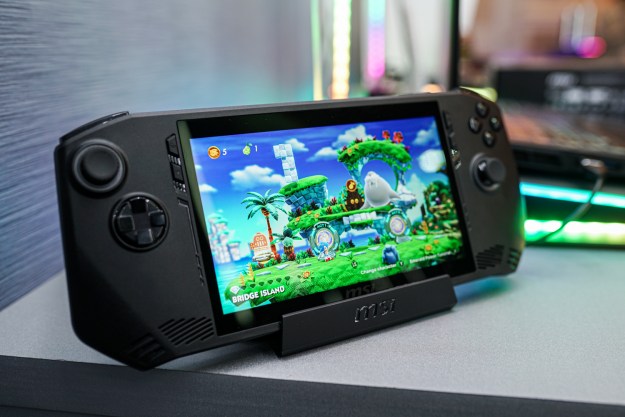 Check out our full review of the Leap Motion gesture controller.
Check out our full review of the Leap Motion gesture controller.
We recently got some hands-on time at CES with Leap Motion’s final version of its gesture control device, the Leap. The revolutionary product is currently available for pre-orders on Leap Motion’s site, but the company announced today that it will also begin taking preorders for the Leap exclusively via Best Buy stores – both online, and brick-and-mortar – starting in February.
As a small startup that had nine employees just eight months ago, signing on with Best Buy is kind of a big deal. January’s been a good month for Leap Motion. At the beginning of the month, the company struck a deal with Asus to bundle its hardware with select PCs to allow for gesture-controlled computing. At the same time, Leap Motion also announced that it closed a $30 million round of funding from existing investors. This little company is moving on up.
We spoke to Andy Miller, president and COO of Leap Motion, who said the partnership with Best Buy is a “big milestone and a significant box to check in getting all of the company’s ducks in a row for launch.” Though the release date hasn’t been confirmed, it will come some time before the end of the quarter, says Miller, which means we’ll be seeing the Leap before the end of March.
Though the Leap might be able to interact with apps already in the Mac or Windows stores, depending on how they’re built for touch, Leap Motion is creating its own app store of specifically gesture-based apps.
When Leap Motion first launched its promo video back in May and started taking preorders, the company received an overwhelming response from developers asking for a Leap Motion development kit. The company received more than 50,000 applications from developers hungry to build apps for the Leap and narrowed it down to 12,000, sending devices out to developers in almost every country around the world. “We’re starting to see the fruits of their labor working with our SDK and starting to submit apps to our app store,” Miller said.
When a user plugs in their Leap they’ll be able to do two things. First, they’ll be able to browse the Web by pinching, scrolling, and zooming on their Windows 8 or Mac OS X 10 device. Secondly, they’ll be able to download apps from the app store. Though they won’t all be ready at launch, users will have access to apps that, according to Miller, “show off the power and precision of the Leap technology.” This includes the 3D nature of these apps, and the incredible lack of latency that the Leap provides. Leap’s app store will be similar to the Mac App store in that apps will range from $1.99 to $9.99. Some apps will even be in the thousands. “We have people building some pretty significant software, such as CAD and other professional applications,” Miller said.
Clearly, there’s still a lot of mystery behind the Leap and its app store. Though Leap Motion is launching with Best Buy, Chris Loeper, Leap Motion’s vice president of worldwide consumer business, told us there’s a lot more to come on the retail side. We weren’t surprised to hear it, but Loeper also confirmed that Asus isn’t the only OEM Leap Motion is teaming up with. The company told us that it plans to make more announcements over the next two months in regards to more partnerships with OEMs. When asked which ones Leap Motion was looking at, Miller responded with “all of the OEMs.”
A lot has happened for Leap Motion in the first two weeks of the year. If the rest of it is as fruitful, we’re in for an exciting 2013.


